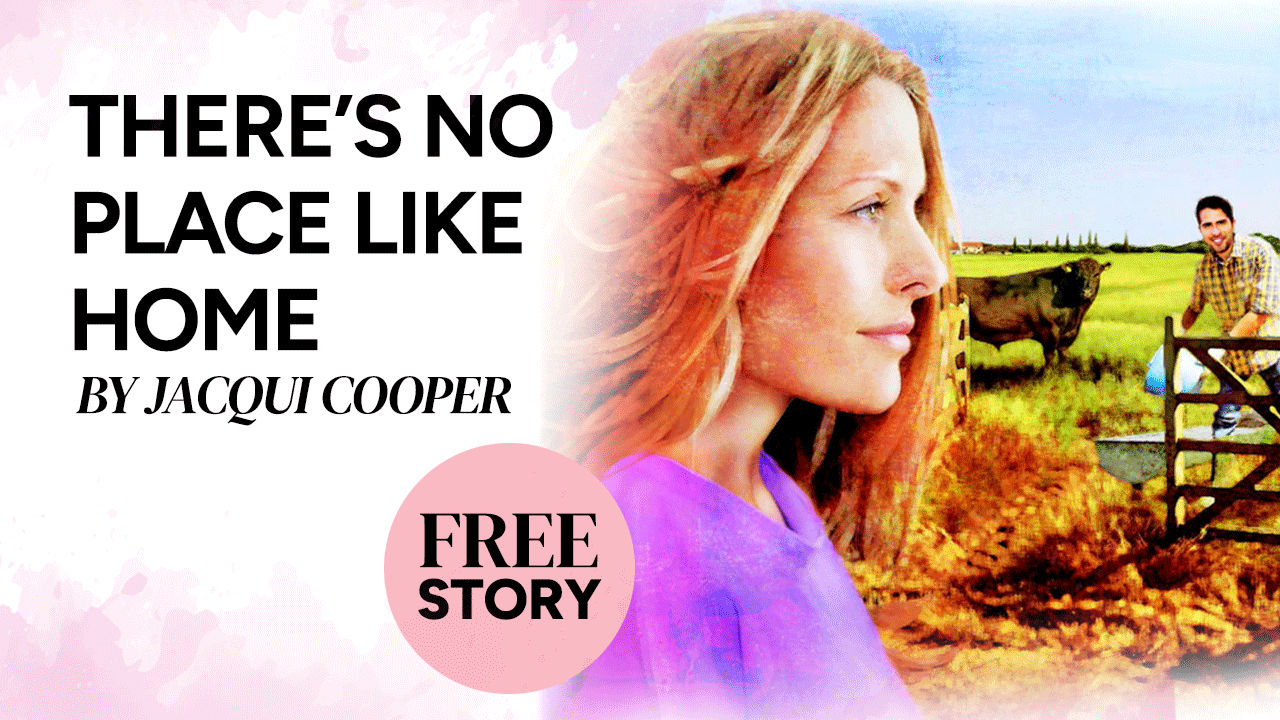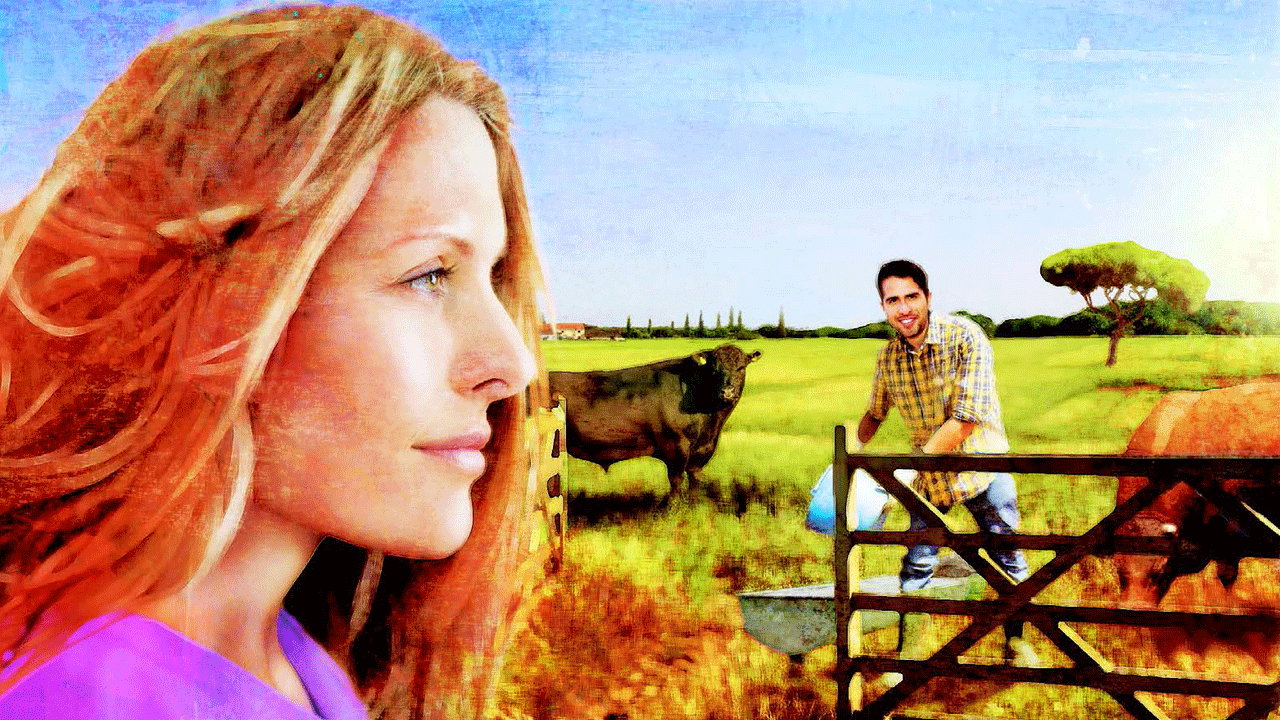Enjoy "There's No Place Like Home", a free short story from "The People's Friend"

Iona had grown up in Scotland, but here, in Portugal, she felt like she belonged…
Iona made her coffee and carried it out to the veranda. This was her second week in a rented cottage on this Portuguese farm, and the sunrise never grew old. She placed her coffee on the wooden table where her laptop already rested. Beyond the nearest field she could see a figure carrying a bucket of feed down the farm track, and her heart sank.
Although he was a fair distance away, she recognised him as the man who came to help when João, the farmer she was renting from, was away. The internet had crashed last night – too late to disturb João. She’d hoped to catch him first thing, but if this guy was here, it meant João wasn’t.
Iona had spent some time living as a digital nomad. A good internet connection was essential for her online PA services and she had an important project to deliver today. After slipping on her sandals, she walked across the parched lawn, over the field and down the track. The man had gone into a field with João’s two bulls: a hefty Limousin and a young Aberdeen Angus. The sight of the stocky black beast was familiar enough to bring on a wave of homesickness. The bulls were placid and obviously at ease with him, standing patiently while he filled a trough with food from his bucket to supplement the sparse grass.
Still, Iona held back, knowing better than to cause any disturbance around such powerful creatures. Only once their heads were down in the trough did she speak softly. “Excuse me?” The man hadn’t reacted to her approach, though she was pretty sure he was aware of her. Now he looked up, regarding her with deep green eyes. He was about her age, in his early thirties, and good looking.
He was kind of swarthy, with his morning stubble and rolled-up sleeves revealing tanned, powerful forearms. Self-consciously Iona realised she’d left the house wearing old trackie bottoms and without so much as running a comb through her long hair.
Now she caught it at the nape of her neck to keep it from flying about her face in the breeze. “I was wondering if you know when João will be back?” she asked him. He didn’t reply, and she struggled for her few words of Portuguese before quickly giving up. “João,” she said again, making it a question.
“Home?” He shrugged expansively, which she translated as he didn’t know. But the job Iona was working on absolutely had to be delivered today.
“It’s the internet,” she said a little desperately. “I need it. For work. Computer.” Had she really just made little typing gestures with her fingers? He looked at her for a long moment, and she thought she saw a glimmer of amusement in his eyes, but he picked up his bucket and climbed the gate without saying a word.
Instead of heading back to the barn, he made for the house. Iona followed, trying to match his long stride. “I’m sorry to take up your time like this,” she apologised. “I tried ringing João, but he doesn’t pick up.” The man made a sound that suggested he was equally unimpressed by his boss’s communication skills.
Iona was renting one half of the long, narrow, traditional farmhouse, but the man made straight for João’s half of the building. Pulling out a ring of keys, he selected one and opened the heavy wooden door, kicking off his dusty boots before entering. Iona waited by the door as he quickly found the router.
A moment later he turned to her with a raised eyebrow. “Let me check,” Iona said. She scampered the length of the veranda to where she had left her laptop on the table. He waited in João’s doorway till she gave him a thumbs-up.
“Thank you so much. I’m Iona.” He was pulling his boots back on.
“Cristiano,” he said grudgingly, before setting off once more towards the barn. “Thank you,” she called. “I am sorry to have troubled you.” She watched him depart. João, her elderly landlord was the friendliest, most talkative man ever, but his farmhand was the polar opposite.

Illustration by Philip Crabb
She grinned. He was far better looking than João, though. Even from the back. With the internet restored, the e-mails flooded in and Iona worked hard all morning. However, once the distraction of work was over, she was still left with a lingering feeling of homesickness for stocky black bulls and windswept Scottish hills, so she Facetimed her parents.
“Hi, love,” her mother greeted her warmly. “How are you? Are you still in Portugal?” “For the moment.” They chatted for a bit. In the background, Iona could see step-ladders, and her mother showed her the colour she’d chosen for the walls of the new Edinburgh flat.
“There’s a room ready for you any time you want it,” Mum told her casually. Iona pretended not to hear. “How’s life in the big city?” she asked instead. “Wonderful. Being able to simply walk into a shop and buy what I want instead of waiting three weeks for delivery is a real treat. “Any idea when we’re likely to see you?” Mum asked lightly. Iona’s answer was always the same.
As was the guilt. “Not just yet, Mum.” “OK, love. Look after yourself. Do you want to speak to your dad?” “Yes, please.” She told her father all about João’s bull. “He looks just like Hamish. I could almost imagine I was home.” “I wouldn’t want to try to get Hamish up these tenement stairs!” Her dad laughed. “What about the sheep? You said last time that it was near lambing.”
“It is. In October, too! It’s the world turned upsidedown. It’s a lot warmer here, so it is much more civilised than shivering in the snow.” Iona had been working in Venezuela when her parents had told her they were selling the farm. With lockdown restrictions in place at the time, she hadn’t been able to come home, which meant she hadn’t said goodbye – not to the house, to the land or the animals.
She hadn’t realised how bad she would feel about that until it was too late. The loss of her old life had left her feeling adrift, and she was still unsettled when she finally ended the call with her folks. Deciding she had done enough work for the day, she caught the bus into the village and did some shopping, then found a table under a lemon tree in the courtyard of a small restaurant that was heaving with locals.
To her surprise she saw Cristiano sitting alone at one of the tables. Gone were the dusty jeans and boots. Now he wore a crisp white business shirt, open at the collar. He really was very easy on the eye. He didn’t notice her, his attention on the laptop open in front of him. It seemed he was having a working lunch. A group of men at a neighbouring table were enjoying a rowdy argument with their food.
“Hey, Cristiano!” one of them called. “How do you say this in English?” Cristiano looked up and saw Iona. “Hey, Cris?” the man called again. Cristiano translated and the men thanked him, their argument settled. Then he quickly dropped his gaze back to the laptop, but Iona noticed he was no longer typing.
Well, well. She concentrated on her lunch, but a few minutes later a shadow fell over her table. She looked up to see him, laptop tucked under his arm. She shielded her eyes with her hand. “Hello, again.” “Good afternoon.”
She felt he wanted to say something more, but a silence had fallen over the men at the ot her table as they listened in. After a moment, Cristiano simply gave a nod and moved away.
The farm enjoyed gorgeous sunsets as well as sunrises. That evening, as Iona sat on the veranda again, she watched Cristiano, once more in work clothes, checking on the pregnant ewes in the field nearest the house.
When he was done, he walked towards her and stopped awkwardly at the foot of the steps, clearing his throat. “I want to apologise for my rudeness this morning.” Iona grinned. “And you learned English just for that? I’m flattered.”
He actually blushed, which was very attractive on such a large man. “Yes. About that, too,” he mumbled sheepishly. She let him off the hook. “It’s OK. You don’t have to explain.” “Yes, I do.” He ran his fingers through his hair. “I had a breakfast meeting scheduled at work this morning, but I woke to a message from João saying he’d been called away.
“He asked if I could take over the morning chores. I admit I was harassed, but that was no excuse for my behaviour. “As for pretending not to speak English.” His colour deepened even more. “João has a lot of different people renting this cottage over the summer . . .”
“And some make themselves a nuisance,” Iona finished for him. “It’s OK. I understand. I had a drink with João last night.” The old man had been delighted to discover she could talk knowledgably about his beloved animals. “He didn’t mention anything about a trip,” she continued. “Is he OK?” Cristiano made a face.
“He’s not taking my calls, either. Don’t worry,” he added quickly. “He does this every so often. Disappears, I mean.” A sudden smile lit up his face. “I think it’s part of his cunning plan to force me to get more involved in the farm.” “It is?” He nodded.
“My father was João’s farm manager. I grew up here, so I’ve known João all my life. “He makes no secret of the fact he would like me to take over one day. Just as I make no secret of the fact I have no intention of doing so.”
“Wait. You said you talked to João last night?” Cristiano asked her, frowning. “Yes, why?” “And he knows you need the internet for work?” “Yes?” “This morning –” A sudden bleating, carried to them on the evening air, interrupted him. Cristiano spun round, already moving.
“Sorry. I’d better go and see what’s up. It might be a fox.” Iona rose to her feet, following swiftly. “I don’t think so.” “You don’t?” “Listen,” she said, hurrying along beside him. “It’s only one ewe. If it were a predator, the whole flock would be panicking. “And look how relaxed the dogs are,” she added.
The two sheepdogs were lying by the barn, heads on paws, their ears twitching but not reacting the way they would to a threat. Cristiano gave her a sideways look. “You know all this how?” “I’ll tell you later. Come on.” Just as Iona expected, one of the ewes was lying on the ground, restless and snorting. Cristiano swore. “It looks like she’s in trouble. I’d better call the vet.” “Not yet.” Iona hopped over the wall into the field. “Just roll up your sleeves and follow my instructions.”
Some time later, the ewe and her tiny lamb were tucked up safe and well in a stall in the barn, and Iona and Cristiano were back on her veranda, where she had opened a bottle of wine.
“Where on earth did you learn how to do that?” Cristiano asked, gratefully accepting a glass. Iona told him about the farm. Then, as the wine loosened her tongue, she told him about the sale of the farm, too. Something she had never spoken about to anyone. “I can’t even blame my parents. I was adamant that I didn’t want to take over. “After I finished uni, I went travelling for a bit, then took various jobs abroad. I was hardly ever home.
“They weren’t getting any younger, so when a neighbour made them an offer, they took it.” “And you haven’t been back since?” She shook her head. How could she?
Going home meant standing on the deck of a ferry, spray on her face as her island home drew ever closer, watching a battered Land -Rover careen down the hill towards the ferry terminal as her dad came to pick her up. Going home was not taking a taxi to an unfamiliar city flat.
Cristiano’s green eyes were full of sympathy. “Do your parents know how you feel?” Iona shrugged. “I don’t know. Maybe.” “So what will you do?” Cristiano asked. “I don’t know,” she said again.
“Every time I try to think about the future my mind just veers away. “I psyche myself up to book a flight, and then I jump on a bus or a boat instead and just keep moving.” Her gaze swept the lawn, the darkened fields, the shadowy farm buildings, and she managed a laugh.
“You would not believe how often my travels lead to a stay on a farm.” Cristiano shifted in his seat, and for a second she thought he was going to put his arms around her. For a second she wanted nothing more than for him to do just that.
But after a tiny hesitation he reached for the bottle instead and replenished their glasses. “I can relate,” he told her, sitting back. “After my father died, my mother and I moved into the village. “I still came to the farm every summer, though, to help with the fruit picking. “I love this place. Whenever anyone asked me about home, this was always where I thought of.” “So you moved back here?” Iona asked. He nodded slowly. “Dad never wanted me to get into farming. He wanted an easier life for me. A more secure future. “I guess I want that, too. “But when I was finally in a position to start my own business, and looking for somewhere to settle, this is where I came. “When João offered me a cottage in return for occasional help on the farm, there was no way I could turn him down.
“He doesn’t have kids,” Cristiano explained. “He’s said repeatedly that he’d like me to take over from him, but I honestly don’t think I can do it full time. “I have neither the skills nor the knowledge – you saw me this evening! “Plus it’s taken time to build up my finance business and I don’t want to give that up.”
Iona raised her glass with a wry grin. “So I threw away a farm I didn’t know I wanted, while you have one you don’t want pushed at you. Cheers.” His eyes danced as they toasted each other. “What do you miss most about farming?” he asked. “The animals,” she said promptly. “The calmness of the routine. The passing of the seasons.” She laughed. “But not the Scottish weather.”
“So stay here,” Cristiano suggested. “What?” “We have animals, we have seasons and our weather is definitely better. “Stay for lambing, at least. Or till Christmas. “Stay here while you grieve for what you lost and until your mind feels more settled.” There was something else in his expression. Something that suggested those weren’t the only reasons he wanted her to stay. Still, she was shocked. “I can’t do that. João –” Cristiano laughed.
“I wouldn’t worry about him.” “No? Why?” “When you talked to him last night, did you talk about farming?” “For hours. Why?” “The internet wasn’t playing up this morning,” Cristiano told her.
“The router had been turned off.” “What?” Her eyes widened. “You mean he planned this?” “Maybe not tonight’s drama, no. “But with him gone it was only a matter of time before something happened that was beyond my capability. “No doubt he hoped you would step in to help.”
For the first time in a very long while she felt excitement stir inside her. “You really think João would let me stay?”
“I think he’s counting on it.”
“Actually, he did offer me the cottage until Christmas,” she admitted. She couldn’t read Cristiano’s expression.
“What did you say?” he asked. “I laughed. I thought he was joking.” “What if he wasn’t?” Iona imagined sitting out here in the evenings, chatting with João or Cristiano about her day. “I couldn’t do it on my own. I’d need help . . .”
He leaned forward. “That would be me.” “And I’d still have to work,” she pointed out. “I have contracts to fulfil.” “As do I. We can work around them.” The sounds of the farm came to her on the breeze: the lowing of one of the bulls, the thud of a hoof against a wooden stall.
“I suppose I could speak to João and see what he says,” Iona said. “I mean, I could stay for a bit. Just to see how things work out.”
“Yes. You could stay for a bit.” Cristiano smiled and all the sunsets in the world paled into insignificance. “I think I, too, would very much like to see how things work out.”
Get more uplifting fiction each week with 4 issues for just £1



